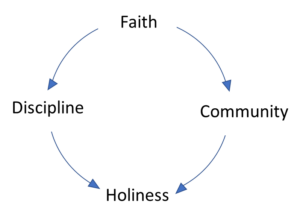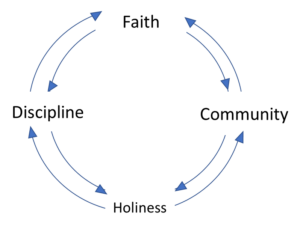
A new year often ushers in resolutions but also new patterns and pathways for activities. For many of us, the start of 2023 meant ushering in new pathways in the form of standing calendar appointments with other people. Project planning meetings, weekly conference calls or new classes, - all established with some stated goal in mind. For some, this process of committing to these regular meeting times provided a certain comfort and predictability while for others, it just produced dread. Regardless, empirical evidence suggests what should not be very surprising: that meeting regularly with others has tremendous benefits - especially when it’s toward a goal and there is an accountability component. Women’s Health Magazine cited a study in which participants had a 65% chance of completing a goal if they told someone else about it and those percentages increased to 95% if they committed to meeting up with that person in real life.
This notion of defining things “in real life” has become a critical designation in our modern communication. In fact, the acronym “IRL” can be found everywhere online – a helpful distinction clueing readers into how to interpret events that are being described. For example, my 12 year old son might describe a brutal fight he was in to a friend – but then has to define it as “not IRL” so his reader knows it was in a video game, not the local school yard. Or my ninth grade daughter might invite someone to study with her “IRL” so it’s clear she’s trying to meet up in person, not Facetime. Our post-Covid, social media-obsessed, text-frenzy, zooming and gaming culture warrants these distinctions and it’s fair to say many of us live life now comfortably straddling two spheres of social existence - online and real.
For the Christian, however, gathering in-person regularly and frequently with other believers is non-negotiable. Scripture teaches broadly on the importance and power of believers being regularly together in one space. Just look at the festivals mandated in Leviticus - all organized to predictably bring people together for remembrance and thanksgiving. Or, look in the New Testament where the notion of community is underscored and believers are exhorted to regularly gather in person for collective prayer, corporate worship, sharing of resources, physical caring of one another and the demonstration of collective witness. (ie, Matt 18:19-20, Acts 2:42, 1 Cor 14:26, James 5:14-15) But perhaps one overlooked benefit is the pursuit of holiness. In Hebrews, it states:
“Let us hold unswervingly to the hope we profess, for he who promised is faithful. And let us consider how we may spur one another on toward love and good deeds, not giving up meeting together, as some are in the habit of doing, but encouraging one another—and all the more as you see the Day approaching.” (emphasis mine) - Hebrews 10:23-25
It’s easy to read this passage and see two unrelated imperative statements: One that commands the reader to hold unswervingly to hope and the other about meeting together to spur one another on in good deeds. The two statements, however, are actually related. Meeting together is the mechanism for holding unswervingly to hope. How so? Believers need one another to provide assurance of the holiness that’s already been granted to them. (10:10-14, 19-22, 29) Hope requires faith in things unseen, and the gift of IRL interactions lets us then see real faith in action. Only in real life do we get a true glimpse into one another’s lives and habits- not the scripted and glossed over persona caught on monitors or phone screens. Certainly, we can gauge a little bit about personality and character over zoom calls and online communication but who someone really is can only be revealed off screen. Through IRL interactions, we learn if their countenance is regularly marked with anxiety, stress, and panic - or do they seem rooted in a calm peace that defies understanding? Does their body language exemplify compassion, consideration and graciousness or does it convey criticism, self-absorption, and hostility? In essence, IRL experiences enable us to see the fruit of the Spirit working in other’s lives in a way that virtual gatherings cannot. And, as we observe that fruit - we, in turn, gain the strength we need to hold unswervingly to the hope we share. Our faith is renewed by it - and we are encouraged to continue in our own pursuit of holiness.
IRL: Breeds Familiarity and Accountability
Beyond the assurance of faith, meeting IRL is the secret sauce that ultimately leads to that familiarity which truly enables us to be an intimate community - so much so that we can call ourselves brothers and sisters. And, it is only through that familiarity that real intimacy is ever achieved -the kind of intimacy that reveals one another’s hardships and the kind that opens up windows for us to give words of encouragement at meaningful times. Sure, hardships can be shared over Zoom calls and social media posts, but it is only through in-person observations that we get the real story on how someone is coping with trials and tribulations. Further, the author of Hebrews exhorts us to continue meeting together because it is only in that loving environment that we can ever extend the kind of encouragement that others truly need. (12:15) And it is also only in that environment that we can ever make way for accountability. This notion of accepting (and expecting) accountability as part of life in community is uncomfortable - but is as essential to the Christian walk as much as meditation, prayer, worship or service. Quite possibly, the pursuit of personal holiness is reliant upon it. Left alone and without this form of discipline, believers would remain obtuse much of the time to the negative impact of their actions or words on others. Moreover, in isolation or with only superficial interactions, our hearts would tend to stray (3:12-14) and drift away. (1:2) It is only in IRL community, where those familial relationships have been established, can there be enough love, trust, and consideration to candidly hold others to account for their misdeeds. Otherwise, we get away with easily justifying and defending our besetting sins. Said otherwise, without IRL community, our sinful tendencies have fertile ground to flourish.
A Broader Look at Hebrews Reveals a Cycle toward Holiness
Earlier, we noted how the author of Hebrews rallied believers in 10:24-25 to continue meeting because doing so would help them hold onto hope without swerving. His message comes on the tail of explaining Christ as the perfect High Priest - whose bloody love made us holy once and for all. In that same letter, however, our holiness is described as something is still in progress. (10:14, 12:10) The formula for achieving this is expounded upon across the entire letter - a cycle that starts with our confession of faith and then simultaneously pushes us toward both community and discipline. The synergy of the two results in increased personal holiness. Consider this illustration:

When new believers come to faith and experience true repentance, they are drawn to others who share this faith. Simultaneously, they feel prompted to make changes in their life to reflect their newfound identity in Christ and new appetite for holiness. Both desires, for holiness and community, drive them toward accepting new disciplines in their life as they witness how mature Christians walk in faith. They adopt personal habits such as regular worship, bible study, discipleship, or prayer and distaste develops for destructive habits and life patterns. New believers might read about these concepts in Scripture or hear about them from the pulpit, but generally, it requires witnessing those practices in the lives of others that a new believer incorporates them into their own life. And, as new believers become increasingly set apart from their old ways, they experience greater intimacy with God, resulting in a personal holiness.
The reverberating effect is that the new believer, equipped with that deeper sense of holiness, is now drawn further into community - experiencing an openness and calling to go deeper in relationship with other brothers and sisters of the faith. Similarly, the new believer’s holiness prompts even greater discipline which then leads to a desire to tame the flesh and renew the mind so he or she might not only grow in love for both God and neighbor - but also begin to reflect the Savior. This pursuit of personal holiness through the channels of community and discipline become acts of physical worship to the God who gifted us with our initial faith. And by design, the reward is fitting: increased faith to continue the cycle of our sanctification.

This gift of increased faith ultimately comes from the hand of God but the responsibility to pursue IRL community and holiness are fully ours - as is our willingness to fully accept and adopt discipline in our lives. The author of Hebrews reminds us of this multiple times using words like “take care,” “hold fast,” and “strive” as they relate to the vigorous, intentional and proactive pursuit of our faith. (3:12-13, 4:11, 4:14, 6:18, 10:23, 12:14) Further, discipline in our lives does not come just through accountability or through the adoption of new personal habits. Discipline is administered from God himself as he allows us to endure trials, face the consequences of our own sin, and experience conviction in our hearts. All so that we might share in His holiness. (12:5-11)
IRL Community: There is No Substitute in the Pursuit of Holiness
It’s telling that the author of Hebrew closes his letter correlating our pursuit of holiness with surrounding ourselves with others. Over the last two chapters, he provides imagery of three concepts that drive home this notion that we were not meant to travel the Christian life alone. He references the fact that we no longer are promised land but a city. (11:16) He also reminds us that we are surrounded by a cloud of witnesses and encourages us to see ourselves as running a race. (12:1-2) All three images - the city, the race, and the witnesses - express the notion of being in IRL community. Consider it: Cities are filled with people dwelling in close knit communities. Races are comprised of people running side by side toward a common goal. And witnesses are clusters of people who have seen or experienced the same event or phenomena. All these concepts speak to the notion of intentionally aligning and intertwining our lives with others who share a goal of personal holiness. For as the author of Hebrews reminds - holiness is needed if the goal is to see the Lord. (12:14) If so, then our pursuit of personal holiness must first be predicated by a commitment to doing life IRL.


